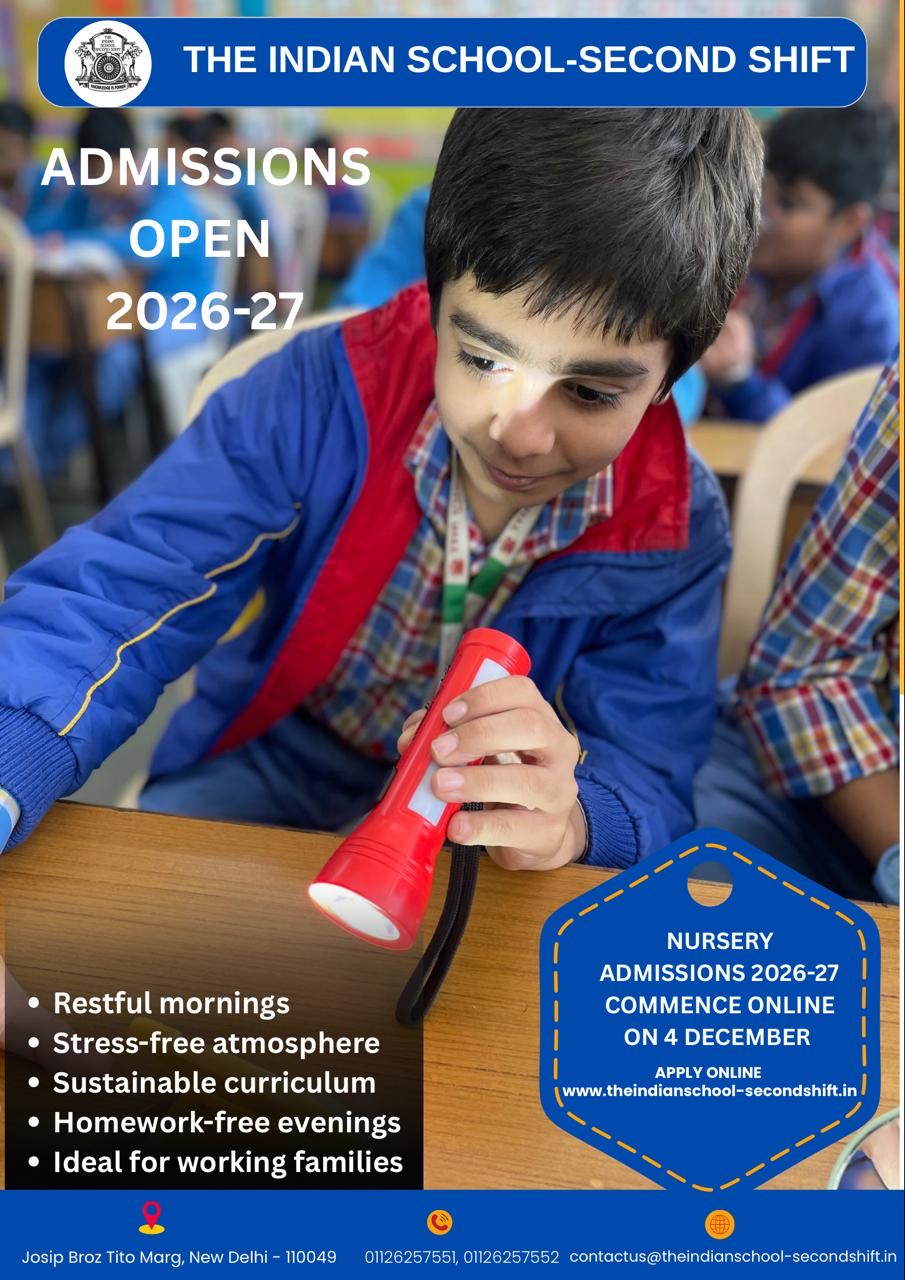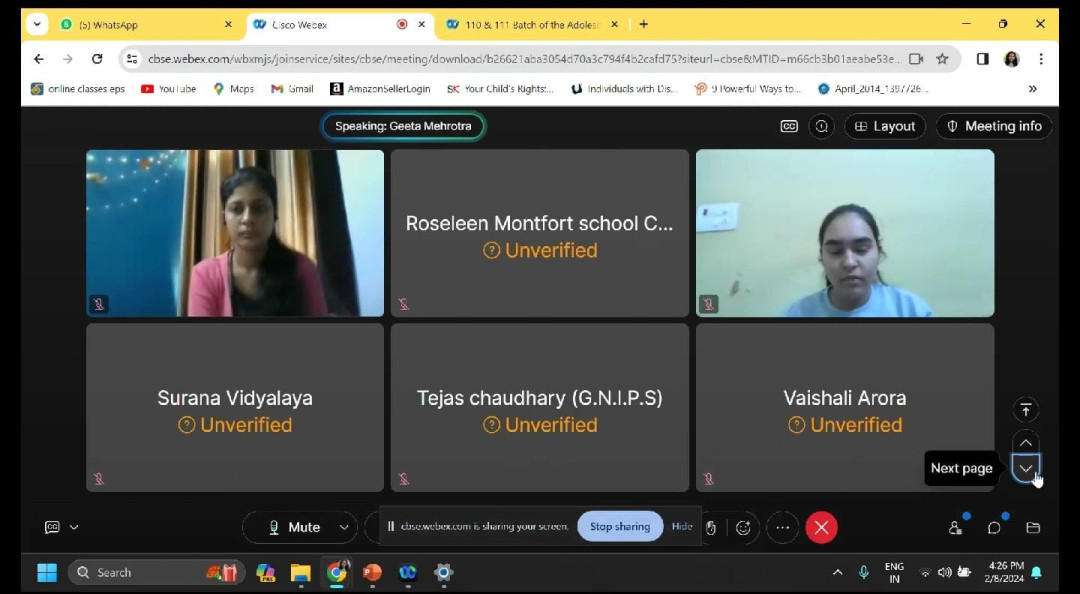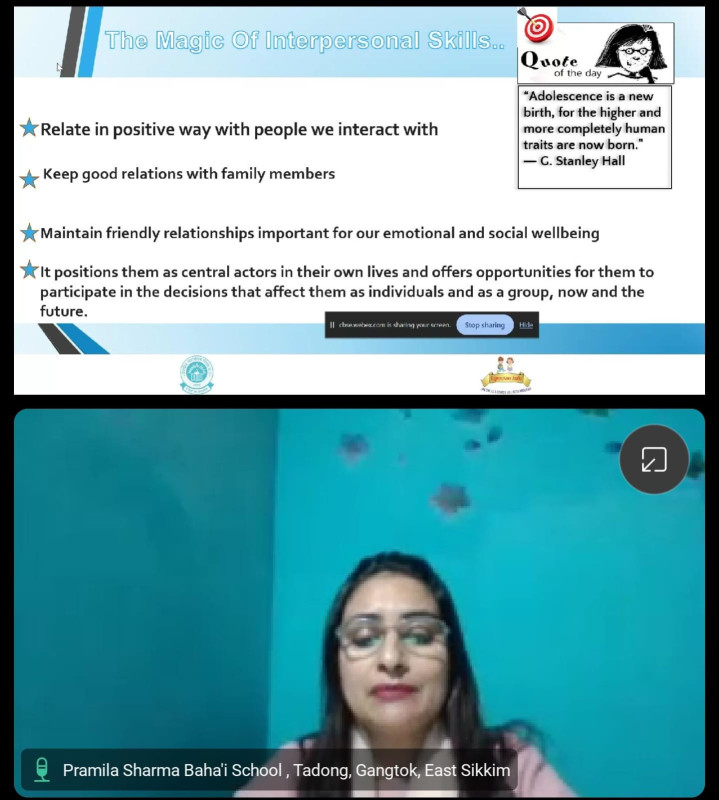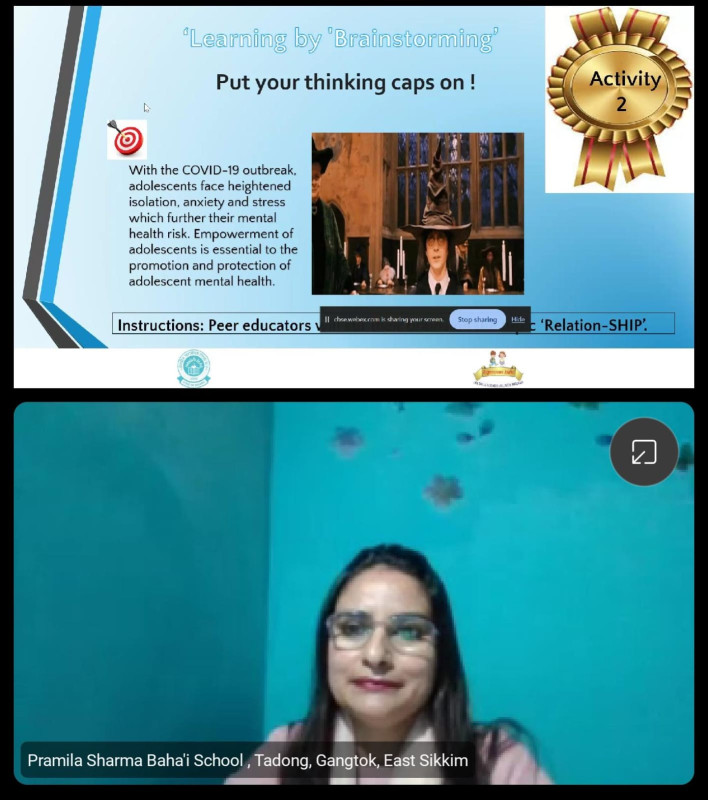CBSE Adolescent Peer Educators Life Skills Leadership Programme
The Central Board of Senior Secondary Education (CBSE) in collaboration with Expressions India, conducted a training for adolescents, ‘Adolescent Peer Educators Life Skills Leadership Program’ from 5th to 9th February, 2024. Several schools from across the country came together on a virtual platform to participate in the training. Riddhi Solanki (IX-A), Siddhi Solanki (IX-A), Rudra Dubey (IX-A) & Moayin Ali Wani (IX-A) represented The Indian School- Second Shift as adolescent peer educators, accompanied by their teacher, Ms Anupriya. The purpose of the programme was to impart life skills to the students that are useful in the context of everyday life and relevant to contemporary times. Its key objective was to enable them to recognise the role of mental health and well-being and to make them apply their best efforts to practically execute the learnings from the training, in creative ways. The training programme was divided into four days with one key module encapsulating a different theme each day.
Day 1
On the first day, the students were introduced to the objectives of the programme along with its relevance in contemporary times and how it would empower them. The first theme focused on the commonly observed health concerns such as nutritional issues, substance use/abuse and puberty related issues. The key messages of the module centred on normalising the emotional storms of adolescence. Students were encouraged to turn to parents, teachers and mentors for emotional support during this period. They were encouraged to take care of their well-being in a holistic way. The utility of critical thinking skills were emphasised on and the significance of exercising one’s personal choices in a mindful way was highlighted. The skills undertaken within the realm of life skills included self-awareness, coping with emotions, empathy, communication, interpersonal relationship skills, coping with stress, problem solving, decision making, creative thinking and critical thinking. By initially integrating these ideas into their own lives, the adolescent peer mentors were encouraged to think of creative ways in which they could subsequently facilitate the other students of their school.
Day 2
The next theme was titled ‘Building resilience for coping and capacity building’, which began with a short ice-breaking activity, followed by introducing the students to the importance of resilience- the capacity to bounce back from any hurdle. It was highlighted that resilience does not mean that the students will not be affected by challenges or adversities, but they will acquire the skill to deal with these difficult situations. Through various activities, the role of self-perception and how it impacts resilience were discussed. Students were further invited to reflect on people who they think of as personal heroes and to reflect on their qualities, and find ways to integrate them in their everyday life.
Additionally, two case studies were used to foreground how resilience isn’t acquired in isolation but is a collective responsibility. Positive self-talk, the creation of safe space for both self and the others were qualities that the students were encouraged to embrace. The day’s proceedings helped students to notice that problems may differ in intensity and degree from one person to the other, but self-compassion and a less punitive inner dialogue could enable them to bounce back from any situation that life throws at them.
Day 3
The third day’s theme centred around ‘A healthy expression of emotions’. After a recapitulation of the previous session, the students collectively introspected on what the term ‘emotion’ meant. Through an activity, the students were invited to reflect on their emotions, especially the more difficult ones. Emotions, as per the facilitator, were transient and not permanent. They had a ripple effect on our surroundings.
The adolescent peer mentors were motivated to contemplate on their strengths, values and weaknesses through the metaphor of a flower, where the flower represented their goals, the stem represented their values and the leaves denoted mistakes, bad memories, parts they are ashamed of and which can be shed eventually. Self-awareness, self-regulation, self-motivation and social skills were the key competencies that were nurtured during this session.
Day 4
On the final day of the workshop, the students were introduced to the theme of ‘Digital Literacy’, with the key objective of helping students navigate the internet in a safe way, follow digital etiquette and hygiene along with acquiring some awareness on the downsides of being on the internet. The students were tasked with identifying popular digital logos at the start of the session and collectively asked to reflect on their social media consumption. A trailer of the popular movie titled ‘The Social Dilemma’ was shown to make the youngsters understand that privacy on the internet is a myth and most of the content that we put on the internet leaves a permanent digital footprint. They were also made aware of cyber theft and virtual security breaches. The usefulness of the internet in the context of brand advertising and business expansion through a digital platform were also discussed to highlight the brighter side of the digital world.
The session concluded with the agreement that being safe on the internet is a personal as well as a collective responsibility shared by us, the government, the developer/owner of a particular social media platform besides our teachers, parents and mentors. The children were made aware of the effects of data phishing, harmful games on the internet and the ways in which hackers illegally steal information, which ultimately have a detrimental effect on physical as well as mental health. The child helpline number (1098) was shared with the participants along with various strategies to be safe on digital platforms.
As citizens of a new and rapidly changing world, the rates of emotional crisis as well as mental health issues are growing exorbitantly. To counter that, building relationships that can serve as sites of connection, safety and emotional expression within the school is essential, especially as students navigate through adolescence, which brings forth challenges of various kinds. The concept of enlisting adolescent peer educators is a massive step in this direction. Adolescents are often infantilized for being too young and too impulsive, but this workshop focuses on their ability to carry a great degree of sensitivity and awareness. By being influenced in a positive way, these adolescent peer educators can perpetuate life skills and contribute to a healthier and holistic development of other students as well.












